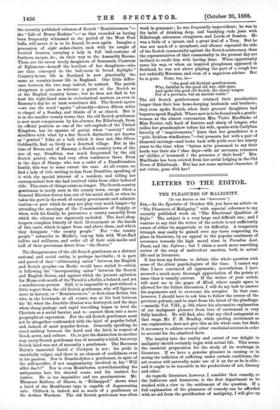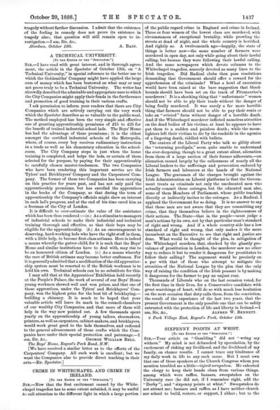LETTERS TO THE EDITOR.
THE PLEASURES OF MALIGNITY.
rTO THE EDITOR Or THE " SPECTATOH.1 SIR,—In the Spectator of October 6th, you have an article on "The Pleasures of Malignity," with especial reference to my recently published work on "The Emotional Qualities of Style." The subject is a very large and difficult one ; and I venture to say that the writer of the article is not sufficiently aware of either its magnitude or its difficulty. A temporary triumph may easily be gained over my views respecting its place in literature, by an appeal to the popular sentiment of reverence towards the high moral aims in Paradise Lost, Faust, and the Inferno ; but I claim a much more searching review of the sway of malevolent emotion, both in actual life and in literature.
It has been my fortune to debate this whole question with some of the ablest psychologists of the time. I cannot say that I have convinced all opponents ; nevertheless, I have secured a much more thorough appreciation of the points at issue than is usually current. If the writer of your article will meet me in the pages of Mind, where ample space is allowed for the fullest discussion, I will do my best to answer his arguments and to overcome his scruples. In that case, however, I should have to ask him to follow the course of the previous polemic, and to start from the latest of the pleadings, —namely, Vol. VIII., p. 562, where his alternative explanation of our malignant pleasure from love of excitement is very fully handled. He will find, also, that my chief antagonist at that stage, Mr. F. H. Bradley, while quoting excitement as one explanation, does not give this as his whole case, but finds it necessary to adduce several other emotional sources in order to account for the admitted facts.
The inquiry into the reality and extent of our delight in malignity should certainly begin with actual life. This seems the essential preparation for the study of its workings in literature. If we have a genuine pleasure in causing or in seeing the infliction of suffering under certain conditions, the art creator will naturally make use of it as far as he is able ; and it ought to be traceable in the productions of art, literary and other.
As regards literature, however, I consider that comedy, or the ludicrous and humorous, is the first department to be studied with a view to the• settlement of the question. If a full explanation of the pleasures of: comedy can be afforded with no aid from the gratification of malignity, I will give up
- tragedy without farther discussion. I admit that the existence of the feeling in comedy does not prove its existence in tragedy also ; that question will still remain open to in- vestigation.—I am, Sir, &c.,



































 Previous page
Previous page